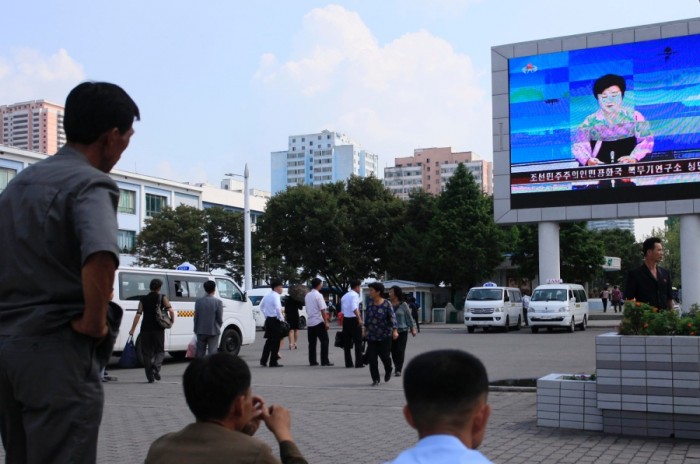
The New York Times reports: "Fewer Chinese people are getting married, a shift with profound implications for China's economic and social life. The decline in marriages means a decline in the number of babies, and potentially less spending on homes, appliances and other family-related purchases — the kind of spending China needs to drive economic growth. Already some businesses are thinking single. Jewelry makers are offering cheaper baubles for unmarried sweethearts. One appliance maker is selling smaller rice cookers. Foreign fertility services are advertising for Chinese women who want to freeze their eggs — a process that is prohibited for single women in China — to have children later. But the marriage slump — caused in large part by China's aging population and the legacy of its harsh one-child policy — has a silver lining. It also stems from the rise of an educated population of women. Specialists in economics, demography and sociology say some of those women are delaying marriage to build careers and establish financial footing, resulting in a more empowered female population that no longer views marriage as the only route to security."
The Washington Post reports: "China responded Monday to calls that it needs to do more to rein in North Korea's nuclear program by saying that American officials were truly to blame for inciting conflict on the Korean Peninsula. The detection Friday of North Korea's fifth nuclear test brought new pressure on China, Pyongyang's economic lifeline and the closest thing it has to a political ally. U.S. Defense Secretary Ash Carter said China had an 'important responsibility' in North Korea. But Chinese Foreign Ministry spokeswoman Hua Chunying told reporters Monday that Carter was 'being too modest.' She cited a Chinese saying — 'Whoever started the trouble should end it' — in calling on the U.S. to 'take on its due responsibility.'"
- Reuters reports: "U.N. experts have pressed the government about deaths in custody and persistent allegations that torture, especially of political prisoners, is rife in police stations and prisons. Chinese officials acknowledge that while illegally obtained evidence and forced self-incrimination of detainees is banned, it still has work to do to eliminate torture. Nonetheless, the government consistently rejects any criticism of its human rights record, saying it adheres to the rule of law. Judicial authorities have 'put in place a system to exclude unlawful evidence and protect the legitimate rights and interests of criminal suspects', the Xinhua state news agency reported, citing the State Council, or cabinet, in a paper it published on legal protection for human rights."
- 2016-09-11 China, Russia naval drill in South China Sea to begin Monday
- 2016-09-09 North Korea’s Nuclear Defiance Leaves China With Few Options
- 2016-09-08 Pressing Asia Agenda, Obama Treads Lightly on Human Rights
- 2016-09-07 Tensions over South China Sea belie summit cordiality
- 2016-09-06 Global leaders test limits of spreading wealth
- 2016-09-05 Seeking smoother summit, ASEAN to skirt mention of South China Sea ruling
- 2016-09-04 China, US talks 'extremely productive'
- 2016-09-02 Hangzhou G20: China's ambitions for global leadership
- 2016-09-01 Obama Heads to Asia Seeking Breakthrough on Trade and Climate Change
- 2016-08-31 China Will Have to Get Used to Being a Terrorist Target
- The New York Times Marriage Falls in China, Transforming Finances and Families
- The Washington Post China says it can't end North Korea nuke program on its own
- Reuters China says has tightened judicial procedures to protect rights
- The Wall Street Journal China Rethinks Its Alliance With Reeling Venezuela
- Bloomberg Business Starbucks New Tea Line Chases China's $9.5 Billion Market
- The Washington Post China says executes 'very small number' of criminals
- Reuters China strategic oil buying slowed in 2016 as teapot imports dominated
- The New York Times Few Expect China to Punish North Korea for Latest Nuclear Test
- The Wall Street Journal Global Economy Week Ahead: Fed Speakers, BOE Meeting, China Factory Output
- The Guardian China: 'world's highest bridge' nears completion in Guizhou
- CNBC Guiyang beats Beijing, Shanghai to title of China's best performing city, Milken Institute says
- Bloomberg Markets China Blames U.S. for North Korea Threat, Questions Sanctions
- The Financial Times China and Russia launch joint naval drills in South China Sea
- The National Interest China's Next Territorial Claim: Hawaii and Almost the Entire Pacific Ocean?
- The Diplomat 4 China Coast Guard Vessels Enter Disputed East China Sea Waters
- The Wall Street Journal: China Real Time Shanghai Police Find Root of Rumors That Sparked Home-Buying Frenzy
- The Economist Defiantly drilling: the South China Sea
- Foreign Policy: Tea Leaf Nation China's G-20: The Most Censored Day of the Year
- Slate Magazine Spy Agency Sends, Deletes Snarky Tweet on Protocol Spat: "Classy as Always China"
- The Wall Street Journal: China Real Time Blackstone's Schwarzman Invests in Elite Education in China
